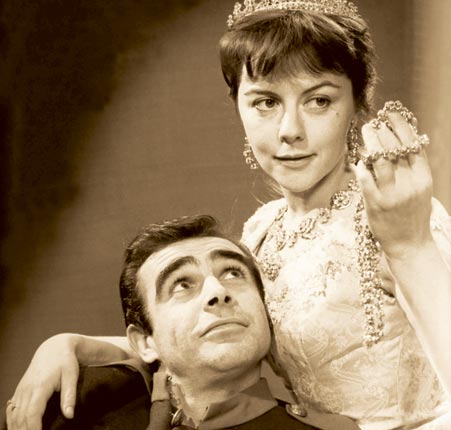David Lister: A priceless drama archive that puts our TV executives to shame
The Week in Arts

It was announced earlier this week that the largest haul yet of missing television footage had been found. The programmes were all made by and broadcast on British television between 1957 and 1969, although the discovery of the "lost" programmes was actually made in America, where the programmes had also been shown years ago on a public broadcasting network.
The tranche of programmes from both BBC and ITV is a significant find. They have not been seen since their original transmission, and contain a host of famous names.
But one sentence leapt out at me in the British Film Institute's announcement of the discovery – and I hope it also leapt out at every senior executive working in television today.
A few paragraphs from the start of the press release was the following detail: "The bulk of the programmes are adaptations of existing literary works (Shakespeare, Ibsen, Chekhov, Cocteau, Anouilh)."
If space permitted, I would like to repeat that sentence several times and then take it and paste it on the doorway of the senior controllers of BBC and ITV. Fifty years ago, the BBC and ITV were routinely broadcasting dramas – and not just those by Shakespeare, Ibsen, Chekhov, Cocteau and Anouilh.
I have remarked before that you would do well to find any of those writers on any of the main channels now. When I quizzed BBC arts programmers on when the corporation last showed a Chekhov play, they were unable to answer.
I took a closer look at the casting of these rediscovered dramas, and it was a mouth-watering array of talent: Sean Connery and Dorothy Tutin in Colombe by Anouilh, Robert Stephens and Maggie Smith in Much Ado about Nothing (Michael Gambon had a walk-on part), Jane Asher as Juliet, Kika Markham in Thomas Middleton's Jacobean drama The Changeling, Emlyn Williams and Dorothy Tutin in Ibsen's The Wild Duck (on ITV), Jill Bennett in Chekhov's The Three Sisters, Leo McKern in Gorky's The Lower Depths, and Peggy Ashcroft in Ibsen's Rosmersholm. The list goes on and on.
I'd love to think that the BBC and ITV will now broadcast all of the rediscovered dramas, but I won't hold my breath. The bigger question is what on earth happened between 1969 and now that caused television controllers to lose all faith in bringing classic drama to the screen? Did viewers signal somehow that they were tired of great drama? That seems unlikely.
What did happen is that at some stage in the intervening years television controllers have taken it upon themselves to decide – in the most dangerously patronising way – that their viewers either could not cope with classic drama or that they might be happier with something completely different.
And in one of the greatest and most depressing changes to British cultural life in the past half-century, television's output of classic drama has gone from a startling embarrassment of riches to zero.
The highly paid people who decide what we watch on television nowadays should spend a week looking at this treasure trove of rediscovered dramas – and then hang their heads in shame.
Festivals may soon be only for the rich
The summer pop festival season is over and as it ended, the NME surveyed its readers on their festival thoughts. They were all quite interesting: the biggest festival let-down was Guns N' Roses at Reading and Leeds, Oasis and Led Zeppelin were the top choices for a reunion next year, and (only) 26 per cent of respondents admitted taking illegal drugs.
But for me the most interesting question was: "Are festivals too expensive?" More than 70 per cent thought they were; 37 per cent said that the cost meant that they had to choose a festival over a summer holiday; and the average spend on festivals during the summer was £379.
No doubt promoters will take comfort from 83 per cent of respondents saying they planned to go to a festival again next year. But they should be careful. Festivals are beginning to be prohibitively expensive. It's not every teenager that can afford the £175 that last week's Bestival on the Isle of Wight cost, even before taking transport into consideration.
Festivals have always been the most democratic art form. It would be a pity if they became a trip for the affluent only.
Valuing the arts just doesn't cut it
The coming spending cuts in the arts need a sophisticated and thoughtful approach and imaginative ideas for raising money, rather than a knee-jerk response saying the arts can't be cut and the government is philistine.
I'm not sure that the "I Value the Arts" initiative from the National Campaign for the Arts is a particularly sophisticated approach in the age of austerity. It aims to encourage grassroots support to fight the proposed cuts. People can post the campaign logo on their websites and social media sites.
I do value the arts. But I also value health. I also rather value education. I value the police. I value a good transport system. I value a clean environment. I value sport. Where exactly does all this valuing get us? We should take it as read we all value the arts. The harder, but more important, job is finding ways of retaining quantity and quality at a time of inevitable cuts.

Join our commenting forum
Join thought-provoking conversations, follow other Independent readers and see their replies